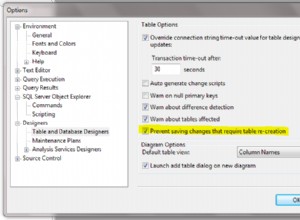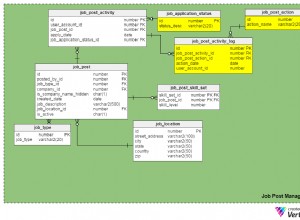EDITAR :para evitar condiciones de carrera
en entornos concurrentes, use WITH (UPDLOCK) en la subconsulta correlacionada o EXCEPT 'd SELECT . El script de prueba que escribí a continuación no lo requiere, ya que usa tablas temporales que solo son visibles para la conexión actual, pero en un entorno real, operando contra tablas de usuario, sería necesario.
MERGE no requiere UPDLOCK .
Inspirado por la respuesta de mcl re:índice único y dejar que la base de datos arrojara un error, decidí comparar inserciones condicionales frente a intentar/atrapar .
Los resultados parecen respaldar la inserción condicional sobre try/catch, pero YMMV. Es un escenario muy simple (una columna, una tabla pequeña, etc.), ejecutado en una máquina, etc.
Estos son los resultados (SQL Server 2008, compilación 10.0.1600.2):
duplicates (short table)
try/catch: 14440 milliseconds / 100000 inserts
conditional insert: 2983 milliseconds / 100000 inserts
except: 2966 milliseconds / 100000 inserts
merge: 2983 milliseconds / 100000 inserts
uniques
try/catch: 3920 milliseconds / 100000 inserts
conditional insert: 3860 milliseconds / 100000 inserts
except: 3873 milliseconds / 100000 inserts
merge: 3890 milliseconds / 100000 inserts
straight insert: 3173 milliseconds / 100000 inserts
duplicates (tall table)
try/catch: 14436 milliseconds / 100000 inserts
conditional insert: 3063 milliseconds / 100000 inserts
except: 3063 milliseconds / 100000 inserts
merge: 3030 milliseconds / 100000 inserts
Tenga en cuenta que, incluso en inserciones únicas, hay ligeramente más sobrecarga para intentar/atrapar que una inserción condicional. Me pregunto si esto varía según la versión, la CPU, la cantidad de núcleos, etc.
No comparé el IF inserciones condicionales, solo WHERE . Asumo el IF variedad mostraría más gastos generales, ya que a) tendría dos declaraciones, yb) necesitaría envolver las dos declaraciones en una transacción y establecer el nivel de aislamiento en serializable (!). Si alguien quiere para probar esto, debe cambiar la tabla temporal a una tabla de usuario normal (la serialización no se aplica a las tablas temporales locales).
Aquí está el guión:
-- tested on SQL 2008.
-- to run on SQL 2005, comment out the statements using MERGE
set nocount on
if object_id('tempdb..#temp') is not null drop table #temp
create table #temp (col1 int primary key)
go
-------------------------------------------------------
-- duplicate insert test against a table w/ 1 record
-------------------------------------------------------
insert #temp values (1)
go
declare @x int, @y int, @now datetime, @duration int
select @x = 1, @y = 0, @now = getdate()
while @y < 100000 begin
set @y = @y+1
begin try
insert #temp select @x
end try
begin catch end catch
end
set @duration = datediff(ms,@now,getdate())
raiserror('duplicates (short table), try/catch: %i milliseconds / %i inserts',-1,-1,@duration,@y) with nowait
go
declare @x int, @y int, @now datetime, @duration int
select @x = 1, @y = 0, @now = getdate()
while @y < 100000 begin
set @y = @y+1
insert #temp select @x where not exists (select * from #temp where col1 = @x)
end
set @duration = datediff(ms,@now,getdate())
raiserror('duplicates (short table), conditional insert: %i milliseconds / %i inserts',-1,-1,@duration, @y) with nowait
go
declare @x int, @y int, @now datetime, @duration int
select @x = 1, @y = 0, @now = getdate()
while @y < 100000 begin
set @y = @y+1
insert #temp select @x except select col1 from #temp
end
set @duration = datediff(ms,@now,getdate())
raiserror('duplicates (short table), except: %i milliseconds / %i inserts',-1,-1,@duration, @y) with nowait
go
-- comment this batch out for SQL 2005
declare @x int, @y int, @now datetime, @duration int
select @x = 1, @y = 0, @now = getdate()
while @y < 100000 begin
set @y = @y+1
merge #temp t using (select @x) s (col1) on t.col1 = s.col1 when not matched by target then insert values (col1);
end
set @duration = datediff(ms,@now,getdate())
raiserror('duplicates (short table), merge: %i milliseconds / %i inserts',-1,-1,@duration, @y) with nowait
go
-------------------------------------------------------
-- unique insert test against an initially empty table
-------------------------------------------------------
truncate table #temp
declare @x int, @now datetime, @duration int
select @x = 0, @now = getdate()
while @x < 100000 begin
set @x = @x+1
insert #temp select @x
end
set @duration = datediff(ms,@now,getdate())
raiserror('uniques, straight insert: %i milliseconds / %i inserts',-1,-1,@duration, @x) with nowait
go
truncate table #temp
declare @x int, @now datetime, @duration int
select @x = 0, @now = getdate()
while @x < 100000 begin
set @x = @x+1
begin try
insert #temp select @x
end try
begin catch end catch
end
set @duration = datediff(ms,@now,getdate())
raiserror('uniques, try/catch: %i milliseconds / %i inserts',-1,-1,@duration, @x) with nowait
go
truncate table #temp
declare @x int, @now datetime, @duration int
select @x = 0, @now = getdate()
while @x < 100000 begin
set @x = @x+1
insert #temp select @x where not exists (select * from #temp where col1 = @x)
end
set @duration = datediff(ms,@now,getdate())
raiserror('uniques, conditional insert: %i milliseconds / %i inserts',-1,-1,@duration, @x) with nowait
go
truncate table #temp
declare @x int, @now datetime, @duration int
select @x = 0, @now = getdate()
while @x < 100000 begin
set @x = @x+1
insert #temp select @x except select col1 from #temp
end
set @duration = datediff(ms,@now,getdate())
raiserror('uniques, except: %i milliseconds / %i inserts',-1,-1,@duration, @x) with nowait
go
-- comment this batch out for SQL 2005
truncate table #temp
declare @x int, @now datetime, @duration int
select @x = 1, @now = getdate()
while @x < 100000 begin
set @x = @x+1
merge #temp t using (select @x) s (col1) on t.col1 = s.col1 when not matched by target then insert values (col1);
end
set @duration = datediff(ms,@now,getdate())
raiserror('uniques, merge: %i milliseconds / %i inserts',-1,-1,@duration, @x) with nowait
go
-------------------------------------------------------
-- duplicate insert test against a table w/ 100000 records
-------------------------------------------------------
declare @x int, @y int, @now datetime, @duration int
select @x = 1, @y = 0, @now = getdate()
while @y < 100000 begin
set @y = @y+1
begin try
insert #temp select @x
end try
begin catch end catch
end
set @duration = datediff(ms,@now,getdate())
raiserror('duplicates (tall table), try/catch: %i milliseconds / %i inserts',-1,-1,@duration,@y) with nowait
go
declare @x int, @y int, @now datetime, @duration int
select @x = 1, @y = 0, @now = getdate()
while @y < 100000 begin
set @y = @y+1
insert #temp select @x where not exists (select * from #temp where col1 = @x)
end
set @duration = datediff(ms,@now,getdate())
raiserror('duplicates (tall table), conditional insert: %i milliseconds / %i inserts',-1,-1,@duration, @y) with nowait
go
declare @x int, @y int, @now datetime, @duration int
select @x = 1, @y = 0, @now = getdate()
while @y < 100000 begin
set @y = @y+1
insert #temp select @x except select col1 from #temp
end
set @duration = datediff(ms,@now,getdate())
raiserror('duplicates (tall table), except: %i milliseconds / %i inserts',-1,-1,@duration, @y) with nowait
go
-- comment this batch out for SQL 2005
declare @x int, @y int, @now datetime, @duration int
select @x = 1, @y = 0, @now = getdate()
while @y < 100000 begin
set @y = @y+1
merge #temp t using (select @x) s (col1) on t.col1 = s.col1 when not matched by target then insert values (col1);
end
set @duration = datediff(ms,@now,getdate())
raiserror('duplicates (tall table), merge: %i milliseconds / %i inserts',-1,-1,@duration, @y) with nowait
go




